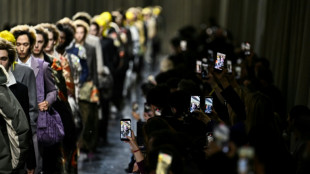
-
 Interim Venezuela leader to visit US
Interim Venezuela leader to visit US
-
Australia holds day of mourning for Bondi Beach shooting victims

-
 Liverpool cruise as Bayern reach Champions League last 16
Liverpool cruise as Bayern reach Champions League last 16
-
Fermin Lopez brace leads Barca to win at Slavia Prague

-
 Newcastle pounce on PSV errors to boost Champions League last-16 bid
Newcastle pounce on PSV errors to boost Champions League last-16 bid
-
Fermin Lopez brace hands Barca win at Slavia Prague

-
 Kane double fires Bayern into Champions League last 16
Kane double fires Bayern into Champions League last 16
-
Newcastle pounce on PSV errors to close in on Champions League last 16

-
 In Davos speech, Trump repeatedly refers to Greenland as 'Iceland'
In Davos speech, Trump repeatedly refers to Greenland as 'Iceland'
-
Liverpool see off Marseille to close on Champions League last 16

-
 Caicedo strikes late as Chelsea end Pafos resistance
Caicedo strikes late as Chelsea end Pafos resistance
-
US Republicans begin push to hold Clintons in contempt over Epstein

-
 Trump says agreed 'framework' for US deal over Greenland
Trump says agreed 'framework' for US deal over Greenland
-
Algeria's Zidane and Belghali banned over Nigeria AFCON scuffle

-
 Iran says 3,117 killed during protests, activists fear 'far higher' toll
Iran says 3,117 killed during protests, activists fear 'far higher' toll
-
Atletico frustrated in Champions League draw at Galatasaray

-
 Israel says struck Syria-Lebanon border crossings used by Hezbollah
Israel says struck Syria-Lebanon border crossings used by Hezbollah
-
Snapchat settles to avoid social media addiction trial

-
 'Extreme cold': Winter storm forecast to slam huge expanse of US
'Extreme cold': Winter storm forecast to slam huge expanse of US
-
Jonathan Anderson reimagines aristocrats in second Dior Homme collection

-
 Former England rugby captain George to retire in 2027
Former England rugby captain George to retire in 2027
-
Israel launches wave of fresh strikes on Lebanon

-
 Ubisoft unveils details of big restructuring bet
Ubisoft unveils details of big restructuring bet
-
Abhishek fireworks help India beat New Zealand in T20 opener

-
 Huge lines, laughs and gasps as Trump lectures Davos elite
Huge lines, laughs and gasps as Trump lectures Davos elite
-
Trump rules out 'force' against Greenland but demands talks

-
 Stocks steadier as Trump rules out force to take Greenland
Stocks steadier as Trump rules out force to take Greenland
-
World's oldest cave art discovered in Indonesia

-
 US hip-hop label Def Jam launches China division in Chengdu
US hip-hop label Def Jam launches China division in Chengdu
-
Dispersed Winter Olympics sites 'have added complexity': Coventry

-
 Man City players to refund fans after Bodo/Glimt debacle
Man City players to refund fans after Bodo/Glimt debacle
-
France's Lactalis recalls baby formula over toxin

-
 Pakistan rescuers scour blaze site for dozens missing
Pakistan rescuers scour blaze site for dozens missing
-
Keenan return to Irish squad boosts Farrell ahead of 6 Nations

-
 US Treasury chief accuses Fed chair of 'politicising' central bank
US Treasury chief accuses Fed chair of 'politicising' central bank
-
Trump rules out force against Greenland but demands 'immediate' talks

-
 Israeli strike kills three Gaza journalists including AFP freelancer
Israeli strike kills three Gaza journalists including AFP freelancer
-
US Congress targets Clintons in Epstein contempt fight

-
 Huge lines, laughs and gasps as Trump addresses Davos elites
Huge lines, laughs and gasps as Trump addresses Davos elites
-
Trump at Davos demands 'immediate' Greenland talks but rules out force

-
 Australia pauses for victims of Bondi Beach shooting
Australia pauses for victims of Bondi Beach shooting
-
Prince Harry says tabloid coverage felt like 'full blown stalking'

-
 Galthie drops experienced trio for France's Six Nations opener
Galthie drops experienced trio for France's Six Nations opener
-
Over 1,400 Indonesians leave Cambodian scam groups in five days: embassy

-
 ICC rejects Bangladesh's plea to play T20 World Cup matches outside India
ICC rejects Bangladesh's plea to play T20 World Cup matches outside India
-
Prince Harry says UK tabloid court battle in 'public's interest'

-
 Trump lands in Davos to push Greenland claims
Trump lands in Davos to push Greenland claims
-
Balkan wild rivers in steady decline: study

-
 Injured Capuozzo misses out on Italy Six Nations squad
Injured Capuozzo misses out on Italy Six Nations squad
-
Mourners pay last respects to Italian icon Valentino


Proliferating 'news' sites spew AI-generated fake stories
A sensational story about the Israeli prime minister's "psychiatrist" exploded online, but it was AI-generated, originating on one of hundreds of websites researchers warn are churning out tech-enabled fiction masquerading as news.
Propaganda-spewing websites have typically relied on armies of writers, but generative artificial intelligence tools now offer a significantly cheaper and faster way to fabricate content that is often hard to decipher from authentic information.
Hundreds of AI-powered sites mimicking news outlets have cropped up in recent months, fueling an explosion of false narratives -- about everything from war to politicians –- that researchers say is stoking alarm in a year of high-stake elections around the world.
"Israeli Prime Minister's psychiatrist commits suicide," still tops the list of "popular articles" highlighted on Global Village Space, a Pakistani digital outlet, after it made an online splash in November with baseless claims about a suicide note blaming Netanyahu.
A "substantial portion" of the site's content, including this article, appears to be scraped from mainstream sources using AI tools, according to an analysis by NewsGuard, a US-based research organization that tracks misinformation.
After scanning the site for error messages specific to content produced by AI chatbots, NewsGuard said it found significant similarities between the yarn about Netanyahu's "psychiatrist" to a fictitious 2010 article on a satirical website.
NewsGuard analyst McKenzie Sadeghi said when she prompted ChatGPT, from Microsoft-backed OpenAI, to rewrite the original article for a general news audience, the result was "very similar" to the article on Global Village Space.
"The exponential growth in AI-generated news and information sources is alarming because these sites can be perceived by the average user as legitimate, trustworthy sources of information," Sadeghi told AFP.
- Pushing propaganda -
The fabricated article, which came as Netanyahu presses war against Hamas militants in the Gaza Strip, ricocheted across social media platforms in multiple languages, including Arabic, Farsi and French.
A handful of sites published obituaries of the fictional "psychiatrist."
The falsehood also featured on a television show in Iran, Israel's arch-enemy, as its host directed viewers to read the full article on Global Village Space.
The website, which relabelled the Netanyahu article as "satire" after being called out, did not respond to AFP's request for comment.
NewsGuard has identified at least 739 AI-generated "news" sites spanning multiple languages that operate with little to no human oversight and come with generic names such as "Ireland Top News."
But even that list is probably "just the low-hanging fruit," said Darren Linvill, from Clemson University.
Linvill is among the university's disinformation experts who found several Russian-linked websites mimicking news and pushing Kremlin propaganda about the war in Ukraine ahead of the US presidential election in November.
They include DC Weekly, which NewsGuard said uses AI to rewrite articles from other sources without credit.
This site -- which appears to be owned by John Mark Dougan, a former US marine who fled to Russia -- has published a slew of false claims including that Ukrainian President Volodymyr Zelensky purchased two luxury yachts worth millions of dollars with American aid money.
Illustrating the power of AI-led misinformation to influence policy decisions, some US lawmakers echoed the false narrative amid a crucial debate about aid to Ukraine.
- 'Camouflage' -
"Auto-generated misinformation is likely to be a major part of the 2024 elections," New York University professor Gary Marcus told AFP.
"Scammers are using (Generative) AI left, right and center."
The AI-generated content populating websites such as DC Weekly helps "to create a sort of camouflage" that lends more credibility to their false stories penned by humans, Linvill told AFP.
These websites underscore the potential of AI tools -- chatbots even more than photo generators and voice cloners -- to turbocharge misinformation while further eroding trust in traditional media, researchers say.
Their polarizing content, which could whip up turmoil and sway political beliefs, is meant to lure eyeballs and capture ad revenue.
The revenue model for many of these websites is programmatic advertising, which means that top brands may unintentionally end up supporting them, while it may be difficult for governments to clamp down for fear of breaching free speech protections, researchers say.
"I am particularly concerned about its use by for-profit companies," Linvill said.
"If we don't stop and pay attention, it's just going to further erode the line between reality and fiction that is already so blurry."
D.Bachmann--VB




